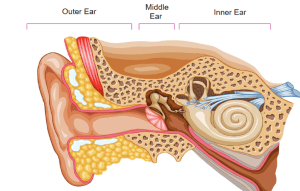Every day we experience noise in our environment. Most sounds that we are around are safe to listen to for extended periods of time, for example, the television, conversations in a restaurant, and household appliances. Some sounds, however, can cause harm to your hearing, especially when exposed to them over a long period of time.

How does loud noise affect your hearing?
Your ear is made up of three parts— the outer, the middle, and the inner ear. Within the inner ear lies the cochlea, which is your organ of hearing, and it houses tiny nerve endings called stereocilia. Sensorineural hearing loss, or SNHL, happens after damage occurs to these stereocilia or to the nerve pathways from your cochlea to your brain. The most common causes of SNHL are age related (presbycusis), family history, and loud noise exposure. Loud noise is particularly harmful to the inner ear. A one-time exposure to extreme loud sound, or listening to loud sounds for a long time, can cause damage to the stereocilia. Over time, this damage causes these cells to die.
The damage from noise exposure is usually gradual. You might not notice it at first. Many people ignore the signs of hearing loss until they become more pronounced. Eventually, sounds become distorted or muffled. You might find it difficult to understand other people when they talk, or find yourself turning up the volume on the television. You may also notice ringing or other noises in your ear called tinnitus. There is no cure for noise induced hearing loss, but hearing aids can help you hear, communicate, and participate more fully in daily activities.
How loud is too loud?
According to the CDC, noise levels of 85 decibels over the period of an 8-hour work day can increase your risk for developing hearing loss. The louder the noise exposure, the less time it takes for the loud noise to potentially cause permanent damage to your ears. For example, while you may be able to use your lawn mower for a few minutes without too much harm to your hearing, a single gunshot blast can permanently damage the stereocilia in your inner ear. See below for some examples of different every day sounds and where they fall on a loudness scale.

How can I tell if I am listening to something too loud?
You do not have to have fancy and expensive decibel readers to measure the sound in your environment! There are multiple decibel level meter apps that can be downloaded on any smartphone that can tell you how loud your environment is. Many smart phones, like iPhones, also allow you to set volume output limits from your phone to ensure you are not listening to music too loud. Just go to your iPhone settings, navigate to “Sounds & Haptics,” and select “Headphone Safety.” Turn on “Reduce Loud Sounds” and make sure it is set to “85 decibels.” This will prevent your phone from putting out sounds louder than 85 decibels that can harm your hearing.
What can I do to protect my hearing?
There are several steps you can take to ensure you are protecting your hearing from loud noise exposure.
- Wear earplugs or other protective devices when around loud noises!
- Consider doubling up with earplugs and earmuffs around very loud noise, like firearms.
- If you can’t reduce the noise, move away from it.
- Remember to not only protect your own ears, but the ears of your loved ones as well. Make sure your children are wearing hearing protection when around loud noises, like at a shooting range or when hunting, at a loud concert, or when setting off fireworks for Fourth of July.
How can Audiology Associates of North Florida help you to protect your hearing?
Your audiologist can take an impression of your ear to make a custom-fitting earplug for hearing protection. There are several different types of custom hearing protection that can be made.
- Musicians earplugs (solid or filtered plugs, molds for in-ear-monitors)
- Shooter’s protection (electronic and basic)
- Solid plugs for recreational noise exposure (music lovers, wood workers, motorcycle drivers)
- Solid plugs for occupational noise exposure (construction, lawn care, law enforcement)
Please call our office at 850-616-7011 with any questions regarding your hearing, to schedule a hearing evaluation, or to schedule an appointment to make custom hearing protection.


